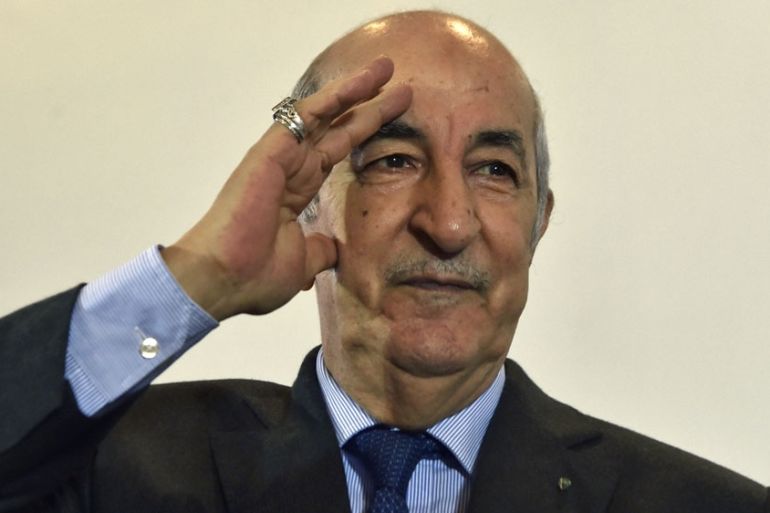Abdelmadjid Tebboune: Who is Algeria’s new president?
Former PM and Bouteflika ally makes comeback but his election is rejected by protest movement seeking old guard’s exit.

Former Prime Minister Abdelmadjid Tebboune has been elected as Algeria‘s new president after a contentious election denounced by the country’s protest movement.
The 74-year-old came first in the five-men presidential race, garnering 58.15 percent of Thursday’s vote, according to official results. Turnout stood at just over 41 percent.
Keep reading
list of 3 itemsAlgerian army chief: Won’t back any leader in presidential polls
Algeria: Bouteflika’s brother sentenced to 15 years in prison
During his four-decade-long political career, Tebboune has held several official positions, including the prime minister’s post under the administration of former longtime President Abdelaziz Bouteflika, who was forced to step down in April in the face of months-long protests.
His tenure as prime minister, which began in May 2017, ended abruptly after less than four months, reportedly due to his alleged attempt to present himself as a successor to Bouteflika during a meeting with his French counterpart, Edouard Philippe, in Paris days before his dismissal.
Concessions to protesters?
Tebboune’s election comes at a critical time for the North African country, which has been rocked by nine months of nationwide protests, at first against ailing Bouteflika’s plans to extend his 20-year rule, and then seeking the sweeping away of all remnants of a ruling elite that has long dominated the country’s politics.
| Abdelmadjid Tebboune’s government portfolios: |
|
However, Tebboune, who is close to powerful army chief General Ahmed Gaid Salah, has in recent months sought to distance himself from what he described as the “gang”.
His disdain for oligarchs in Bouteflika’s inner circle – businessmen who were awarded lucrative state contracts – has won him praise among some Algerians.
Zine Labidine Ghebouli, a political analyst, said although Tebboune was undeniably a “product of the Algerian system”, he would, nevertheless, have to make significant concessions to appease the leaderless movement, known as the Hirak.
“I think he will fulfil most of the protesters’ demands, including the release of political prisoners, guaranteeing freedom of expression and even freedom of the press,” Ghebouli told Al Jazeera.
“[These concessions] however are unlikely to have an impact on the role of the military in political decisions – that will be a red line.”
In his first public comments since his win, Tebboune on Friday said he would “extend a hand” to the protest movement “for a dialogue to build a new Algeria”.
Speaking at a news conference, he also said he would launch “consultations” on drawing up a new constitution that would be put to voters in a referendum and also promised to introduce reforms to slash spending on imports.
His comments came as thousands of protesters took to the streets again on Friday, rejecting the result of an election they decried as a “charade” due to the five candidates’ links to the old guard and reiterating their demands for the departure of the entire political establishment.
Meanwhile, footage posted on social media showed several protesters sniffing flour, an allusion to the May arrest of one of Tebboune’s sons in an influence-peddling case involving several senior officials caught up in a cocaine trafficking scandal.
Tebboune’s supporters say the pre-trial detention of the president-elect’s son is reason enough to believe in his commitment to the independence of the judiciary.